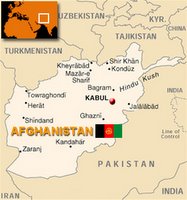 Government-led eradication efforts have yet to have the impact needed
Government-led eradication efforts have yet to have the impact neededWidespread corruption, a growing Taliban-led insurgency in the south, and a lack of proper alternative livelihoods for farmers, are causing a continued rise in poppy cultivation in Afghanistan, officials warn.
"Undoubtedly there is an increase in poppy cultivation this year," Said Mohammad Azam, director of public relations and communications for Afghanistan's Ministry of Counter Narcotics (MCN), told IRIN in the capital, Kabul, adding the government had yet to complete its national survey of poppy cultivated areas.
The southern province of Helmand had seen the largest poppy cultivation this year, Azam said, mainly due to the deteriorating security situation in the area.
"Due to current instability and weak governance, the area of land used for poppy cultivation has nearly tripled this year in Helmand province," the government official claimed.
Although an effective ban on poppy cultivation instituted by the hardline Taliban regime, which was ousted in late 2001, had resulted in a considerable decline in opium production in 2000, today's fledgling MCN confirmed that opium production had increased, despite the fact that over 15,000 ha of poppy land had been eradicated by the government this year compared to 5,000 ha in 2005, due to denser cultivation.
Compounding the problem, corruption amongst government authorities presents a serious challenge for poppy eradication efforts in the landlocked nation of 31 million, where more than half of the population lives below the poverty line and unemployment remains rampant.
"Corruption is the main obstacle towards poppy eradication in the country and there won't be victory unless it is tackled effectively," Azam asserted.
But while the issue of some high-ranking officials in the opium trade has been discussed by the government and members of the international community, nobody has yet to be formally charged.
 "The government knows who are involved [in the drug trade] but there is no action and prosecution against them because of their powerful positions," an MCN official, who requested anonymity, told IRIN.
"The government knows who are involved [in the drug trade] but there is no action and prosecution against them because of their powerful positions," an MCN official, who requested anonymity, told IRIN.Analysts describe poppy cultivation in the Central Asian state as a multi-factorial issue and one that is becoming increasingly complicated.
"Widespread corruption feeds opium production...which in turn fuels insurgency and warlordism," local analyst Qasim Akhgar told IRIN.
Meanwhile, the United Nations has called for a new strategy to deal with the problem.
"Nobody can say that we have been successful if poppy production has increased. And certainly the strategy and the effort have to be rethought. The problem has increased and the remedy has to adjust," Tom Koenigs, Special Representative of the Secretary-General (SRSG) in Afghanistan, said earlier this month.
But that may prove easier said than done given a lack of a sustainable alternative livelihoods and infrastructure for poppy farmers to change.
"For God's sake, we have yet to even see a grain of wheat from anyone while I have to feed my 14-member family. It [taking care of his family] is simply not possible by cultivating wheat," 35-year-old Haji Sher Mohammad, one of many frustrated farmers in the Arghandab district of southern Kandahar, repeated.
According to the UN Office on Drugs and Crime (UNODC), in 2005 drought-plagued Afghanistan produced 4,100 mt of opium with an estimated value of US $2.7 billion, accounting for 52 percent of the country's Gross Domestic Product (GDP). Nearly all the opium produced in Afghanistan, which accounts for 90 percent of world production, is smuggled via Central Asia to Russia, western Europe and beyond.
Reproduced with the kind permission of IRIN
Copyright IRIN 2006
Photo: Copyright Manoocher Deghati/IRIN
Disclaimer: This article does not necessarily reflect the views of the United Nations or its agencies
